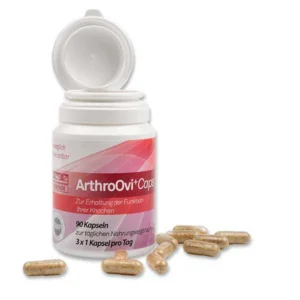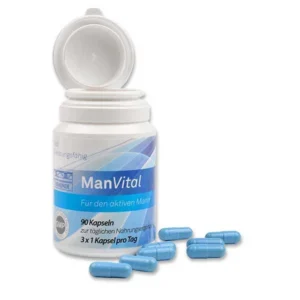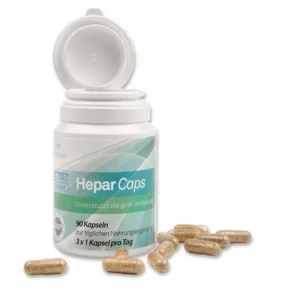
Schilddrüse: Diese Lebensmittel und Nährstoffe halten sie gesund

Die Schilddrüse ist ein kleines Organ, das große Arbeit in unserem Organismus leistet. Mit ihren nur 20 Gramm ist sie für unsere Stimmung und das Gewicht wesentlich verantwortlich. In der Schilddrüse werden Hormone gebildet, die solche wichtigen Körperfunktionen wie Stoffwechsel, Wachstum des Organismus, Verdauung usw. steuern. Mit bestimmten Lebensmitteln und Nährstoffen können Sie dieses kleine Organ im Hals bei seiner Arbeit sinnvoll unterstützen und somit Schilddrüsenerkrankungen vorbeugen.
Erkrankungen der Schilddrüse
Zu den bekanntesten Erkrankungen des schmetterlingsförmigen Organs gehören Unter- und Überfunktion der Schilddrüse. Werden in ihr zu viele Hormone gebildet, spricht mal von einer Überfunktion (Hyperhyriose). Diese führt dazu, dass manche Prozesse in unserem Organismus auf Hochtouren laufen. Solche äußerlichen Anzeichen wie übermäßiges Schwitzen, Nervosität oder Gewichtsverlust können darauf hindeuten. Darüber hinaus erhöht eine Schilddrüsenüberfunktion das Risiko für Herz-Kreislauf-Erkrankungen.
Im Gegensatz zur Überfunktion werden bei einer Unterfunktion der Schilddrüse (Hypothyreose) nicht ausreichend Hormone produziert. Dies verzögert alle Stoffwechselprozesse im Organismus und macht uns müde und schlapp. Darüber hinaus nehmen wir in diesem Fall häufig zu, obwohl sich an Ernährung und Bewegung nichts geändert hat. Kurz zusammengefasst: Die Unterfunktion unseres schmetterlingsförmigen Organs macht uns dick und unglücklich.
Von der Schilddrüsenunterfunktion sind Frauen fünfmal häufiger betroffen als Männer. Die meisten von ihnen wissen jedoch nicht, dass sie darunter leiden. Die Symptome sind nämlich ziemlich unspezifisch. Viele frieren trotz warmer Temperaturen oder leiden an einer Leistungsschwäche und können sich nicht richtig konzentrieren. Wer gerade eine Diät macht, wundert sich, dass das Gewicht eher nach oben geht.
Mit richtiger Ernährung können Sie jedoch einiges bewirken und die Arbeit Ihrer Schilddrüse unterstützen.
Spurenelemente für die Schilddrüse
Eine Schilddrüse, die gute Arbeit leistet, benötigt eine regelmäßige Zufuhr an Vitaminen, Mineralstoffen und Spurenelementen.
Das wichtigste Spurenelement für die Schilddrüse ist Jod. Es ist Bestandteil des Schilddrüsenhormons Thyroxin, weswegen es für den gut funktionierenden Stoffwechsel von hoher Bedeutung ist. Ohne Jod ist also kein Schilddrüsenhormon. Unser Körper kann dieses Spurenelement nicht selbst produzieren und nur bedingt speichern. Aus diesem Grund muss es regelmäßig über die Nahrung aufgenommen werden. Da Deutschland nach wie vor ein Jodmangelland ist, müssen wir besonders gut auf eine ausreichende Jodzufuhr achten.
Ein guter Helfer von Jod ist Selen. Das Spurenelement trägt zur Bildung von Schilddrüsenhormonen bei. Darüber hinaus ist es ein Antioxidans, dass die Entstehung von gesunden Zellen fördert. Neben Jod und Selen spielt auch Eisen eine bedeutende Rolle. Ein Eisenmangel verlangsamt den Schilddrüsenstoffwechsel und kann eine Unterfunktion des Organs verursachen.
Vitamine für die Schilddrüse
Wichtige Vitamine für die Schilddrüse sind A, B12 und D. Vitamin A hilft dabei, das TSH-Hormon auszuschütteln. Das Hormon ist für solche wichtige Funktionen im Organismus verantwortlich, wie Aufnahme von Jod, Durchblutung und Wachstum der Schilddrüse sowie Bildung von Schilddrüsenhormonen.
Das Vitamin D nimmt einen großen Einfluss auf Knochenbildung, Immunsystem und Entwicklung der Zellen in unserem Organismus. Der Bedarf des Sonnenvitamins kann in der Regel über die körpereigene Produktion gedeckt werden. Alleine über die Ernährung können seine Vorräte jedoch nicht gefüllt werden. Eine zusätzliche Einnahme ist oft sinnvoll.
Vitamin B 12 sorgt dafür, dass unsere Nerven stark bleiben. Darüber hinaus ist es an der Zellteilung und Blutbildung beteiligt. Unser Körper kann dieses Vitamin nicht selbst herstellen. Eine Abdeckung des kompletten Vitamin-D-Bedarfs allein über die Ernährung ist demnach nicht möglich. Daher sollte auch dieses Vitamin zusätzlich eingenommen werden.
Lebensmittel für eine gut funktionierende Schilddrüse
Bis auf die Vitamine B12 und D, können wir weitere Vitamine und Spurenelemente, die für die Schilddrüse wichtig sind, in ausreichender Menge durch die Nahrung aufnehmen.
Richtig gute Helfer für unsere Schilddrüse sind Fischprodukte. Sie enthalten Jod und Selen. Vor allem Seefisch, Algen und Meeresfrüchte haben viel an diesem Spurenelement. Bei Algen ist jedoch Vorsicht geboten: Manche Algenarten enthalten zu viel Jod und sollten daher nur in Maßen verzehrt werden. Jodreiche Fischsorten sind Schellfisch, Lachs oder Kabeljau.
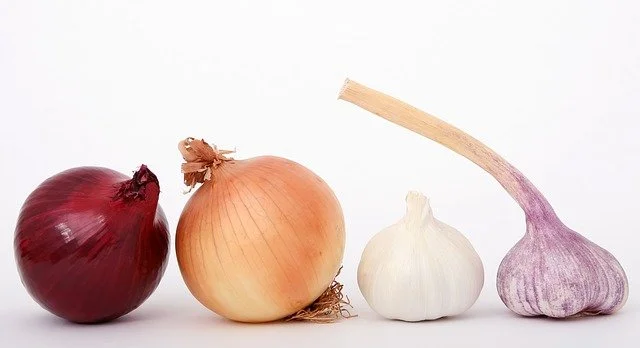
Neben Fisch sind auch Eier gut für die Schilddrüse. Sie enthalten sowohl Selen, Jod, als auch Vitamin B12. Das Nervenvitamin liefern auch Milch und Milchprodukte, die sich durch ein bisschen Joghurt zum Frühstück einfach in den Speisplan integrieren lassen.
Selbstverständlich liefern einige Gemüsesorten gute Vitamine und Spurenelemente, die unser schmetterlingsförmiges Organ unterstützen. Kohl (Brokkoli, Weißkohl) sowie Zwiebelgemüse (Zwiebeln, Knoblauch), aber auch Paranüsse und Linsen sind gute Lieferanten von Selen. Brokkoli, Spinat und Champignons mit ihrem hohen Gehalt an Vitamin C und Eisen unterstützen ebenfalls die Arbeit der Schilddrüse.
Vollkornprodukte und Hülsenfrüchte liefern dem Organismus Zink, Eisen und Selen und sollten daher jede Woche auf dem Speiseplan stehen.
Eine richtig gute Quelle an Jod stellen zudem Kürbiskerne, Cashewkerne und Erdnüsse dar. Andere Nussarten, wie Walnüsse, Erdnüsse und Paranüsse sind reich an Zink und Selen.
Unser Präparat BeautyNorm enthält Vitamine und Spurenelemente, die für Ihre Schilddrüse wichtig sind: Neben den genannten B12- und D – Vitaminen sind in dem Präparat auch A, E und C zu finden. Darüber hinaus ist BeautyNorm reich an Selen. Dank der einzigartigen Kombination dieser Vitamine mit Signalmolekülen (Zellpeptiden) unterstützt das Präparat die Fettverbrennung und hilft Ihnen dabei, Ihrem Wohlfühlgewicht auf natürliche Weise nachzukommen.
Unsere Empfehlung für eine gute Fettverbrennung: BeautyNorm
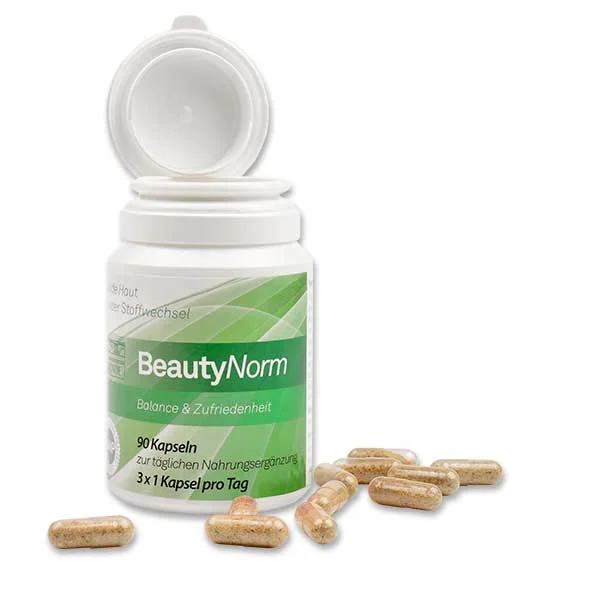
Mehr
Artikel



Immunschwäche aufgrund von Corona: Das können Sie sofort tun

Wechseljahre bei Männern: typische Symptome der Andropause



